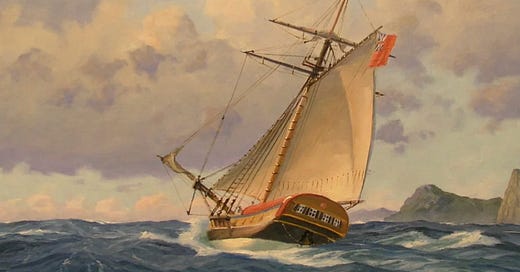Cannibalism and Emigration
When provisions run out, no one knows how to sail the ship, and the only food is your dead companion
In my research last weekend on emigration from Ireland to the Americas, 1760-1815, I came across a reference to a ship called the Seaflower, bound from Belfast, Ireland to Philadelphia, Pennsylvania. The sloop set sail in July 1741 with 108 passengers on board. The reference indicated that the passengers had become desperate when they ran out of provisions and had begun eating their dead.
An example of a sloop from the 1740s. Not an especially large ship.
I finally had time to dig into some primary sources and found the report about the ship listed in the Pennsylvania Gazette, Sunday, November 12, 1741, page 2. It took a while because the ship isn’t listed by name in the report, though the Seaflower was a busy ship and is reported on many times in the Gazette over the period 1730-1750.
Here’s what the newspaper reported about the cannabilism incident:
"From Boston, November 2 (where the ship ended up porting instead of its intended destination of Philadelphia):
Last Tuesday Capt. Thompson, in his Majesty’s Ship Sucess, arrived here, by whom we have Advice, that on the 23rd of October last, about 80 Leagues to the Eastward of Cape Anne, they met with a Sloop in the greatest Distress imaginable: She came from Belfast in Ireland, and was bound to Philadelphia with 108 Passengers; but having been out 17 Weeks, they were so distressed for Provisions that about 30 had died for want, among whom were the Master, and all the Sailors but one, so that they could neither manage the Sails, or steer the Vessel. They had eat up all the Tallow, Candles, &c. and for several Weeks had fed upon the Bodies of those that died; and when the People from the Sucess went on Board, they found the Body of a Man lying upon the Deck partly cut up, and his Arm and Shoulder then boilingin the Pot, in Salt Water, (which had been their only drink for a long Time and so eager were the poor famished People for the Flesh of their dead Companions, that many of them had concel’d Pieces of it in the Pockets, to eat as they had Opportunity). Capt. Thompson was so affected with their miserable Circumstances, that he behaved towards them with the utmost Humanity and Compassion; he put on board a Midshipman and three other Hands to navigate the Vessel, and gave them Beed, Bread, Water, Wine, and many other necessaries sufficient to support them for several Weeks, ordering the Provisions to be at first given to them with the utmost Discretion, according to the Doctor’s Advice, at the same time directing them to steer for this Port; and last Saturday the Sloop arrived, but so many of the People have died since the Man of War left them, that the Number is reduced to 62, and several of them are so weak that ‘tis feared they will not recover. All proffitable Care is taken of them, by Orders of the Select Men. The Master’s Name was Ebenezer Clark, and the Owner’s Name is JOsiah Thompson, who lives in New-Haven Connecticut.”
An Engraving Depicting Canibalism in Brazil from Getty Images. Clearly meant to depict a racist scene and yet the image of a leg/foot in the boiling kettle harkens to the scene on the Seaflower.
Perhaps an extreme example of the issues that emigrants ran into when traveling from Europe to the Americas but the newspaper simply reported the story with no editorial—no comment of suprise or disgust and the Sucess’s captain seemed only to take pity on the people rather than judgement.
Still, there’s much in this account that doesn’t make sense to me. Supposedly the captain and sailors had died of hunger and because of this, the passengers, not knowing how to sail and famished, could no longer steer the vessel. But why hadn’t the captain sailed the ship to Philadelphia BEFORE their provisions ran so low? Was there bad weather? No wind? Perhaps the weather conditions were so well known at the time that the initial cause of the difficulties could be assumed. I’ve no idea. I suppose I could look through the newspaper in the seventeen weeks proceeding this for reports of weather or other ships that had difficulties. Or maybe there was illness on the ship and that took the Captain and the Sailors, which left the ship stranded at sea?
Whatever the root cause, the results remain the same. These people were in a desperate state by the time they reached Philadelphia. It would be interesting to see if a passenger list could be found and then to track those people to see what became of them in their new country. A project for some other historian.






